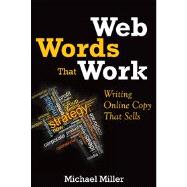
Michael Miller is a successful and prolific author with a reputation for practical advice, technical accuracy, and an unerring empathy for the needs of his readers. He is known for his casual, easy-to-read writing style and his practical, real-world advice—as well as his ability to explain a wide variety of complex topics to an everyday audience.
Mr. Miller has written more than 100 best-selling nonfiction books over the past two decades. His books include The Ultimate Web Marketing Guide, B2B Digital Marketing, YouTube for Business, The Complete Idiot’s Guide to Search Engine Optimization, Online Marketing Heroes, Teach Yourself Business Plans in 24 Hours, 80/20 Guide to Effective Presentations, Webster’s New World Vocabulary of Success, and Management Secrets of the Good, the Bad, and the Ugly. He has also written hundreds of articles for various websites and served as a consultant on the design of many others.
Table of Contents
Part I: Online Copywriting 101
1. What Makes Writing Online Copy Different
2. Conveying Confusing Content, Clearly
3. Grammar, Punctuation, and Other Rules to Live By
4. Keeping It Short and Simple
5. Firing Up Your Readers
6. Finding Your Voice
7. Organizing Your Content
8. Utilizing Links and Outside Content
9. Optimizing Your Copy for Web Search
Part II: Writing for Different Vehicles
10. Writing Web Pages
11. Writing Blog Posts
12. Writing Social Media Updates
13. Writing Email Promotions
14. Writing Online Ads
15. Writing Online Press Releases
16. Writing Online Help Files and FAQs
17. Writing Web Interfaces
18. Writing for Mobile Devices
Part III: Getting It Done
19. Determining the Right Delivery Formats
20. Dealing with Web Page Design
21. Working with Technical and Design Staff
22. The Final Word: Think Like the Customer
The New copy of this book will include any supplemental materials advertised. Please check the title of the book to determine if it should include any access cards, study guides, lab manuals, CDs, etc.
The Used, Rental and eBook copies of this book are not guaranteed to include any supplemental materials. Typically, only the book itself is included. This is true even if the title states it includes any access cards, study guides, lab manuals, CDs, etc.